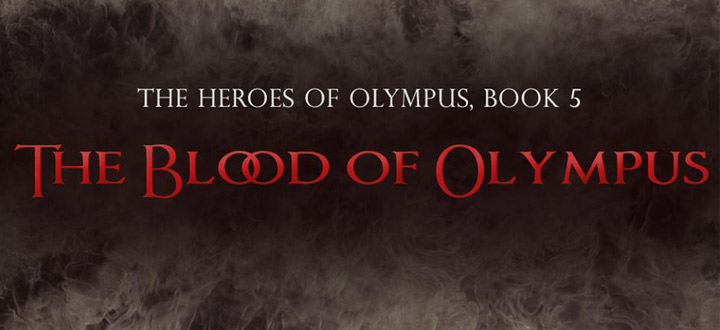It really is the end of an era—at least for me and for the rest of us who grew up with the characters from Rick Riordan’s Percy Jackson universe, which he developed in two separate series, “Percy Jackson and the Olympians” and “The Heroes of Olympus.” Now, the final installment of the latter series, “The Blood of Olympus” has been published, and it’s been quite a journey. Rick Riordan’s books, based on what would happen if the Greco-Roman gods and demigods were still active in our society today, have truly been an enjoyable world to immerse oneself in.
This final book left off with the seven demigods on their way to Greece to save the world from Gaea’s awakening. Gaea, the Greek deity that embodies the Earth, is not a calm “Mother Nature” figure in Greek mythology; she is a chaotic being, and she is slowly awakening. It is up to our Greco-Roman heroes—Percy, Annabeth, Jason, Piper, Leo, Hazel and Frank—to save the world from this happening. Meanwhile, two other characters, Nico and Reyna, along with their satyr guardian, Coach Hedge, are slowly making their way back from Rome to America. They are attempting to bridge the gap between the Roman and Greek demigods, who are on the verge of warfare on American soil, due to their old enmity of ages. Without reconciliation, it will be impossible for the Greeks and the Romans to unify together against Gaea. In this convoluted and hopeless situation, the narrative begins.
Riordan’s use of multiple perspectives in this series has us jumping in between the two major storylines and between character narrations. This can potentially lead to convolution and jumps in between continuity lines within the novel. On one page, we are dealing with a cliffhanger in which the seven heroes have just gotten into trouble with several mythological creatures. On the next, we go back to Nico and Reyna’s struggle in their quest going back to America. Then, in a few chapters, Riordan leaves the Nico-Reyna story at a critical moment to return and resolve the original cliffhanger. These jumps may confuse some readers; however, due to Riordan’s masterful writing, he is able to tie them both together by the end, and leaves this strategy standing as an effective storytelling strategy that keeps the reader suspended in suspense, turning the pages to find out more.
In addition to the storytelling style, Riordan displays an excellent treatment of characterization in this book. Not only is he able to deliver suitable endings to his major characters, which though perhaps controversial (for reasons you will realize when you read the book), remain in character and realistic. Also, readers as invested in the series as I am will be happy to see the characters’ endings at the end, as certain endings left me feeling euphoric about the way that Riordan chose to tie up loose ends. Also, in this book, Riordan expands his treatment of minor characters, providing more background and development for characters that had remained somewhat mysterious up to this point—most notably Nico and Reyna. This development not only adds to the plot but also gives the entire book a far better overall feeling of completion and resolution—it is the final book after all.
Riordan’s use of various forms of humor—everything from puns to references to pure ridiculous characterization and plot developments—also remains as consistent and hilarious as ever. There are scenes where Leo references “Doctor Who” and others, in which a Greek goddess yells at the general audience around her about how “an A minus is a failing grade” (Asian/SIS culture, anyone?). Such comedic moments allow the reader to laugh along with the characters in the book, thus creating high reader engagement with the story and the characters.
So thank you, Rick Riordan, for years of amusement, happiness, enjoyment and torturous suspense after cliffhangers in between books. For those who have been waiting for this book—go out and read it! The ending may surprise you, but Riordan does not disappoint. Those who haven’t read the series, give it a shot! It will be worth it. I look forward to Riordan’s future work with mythology, and I hope everyone else does, too.
Photo Source: Percy Jackson Movies

